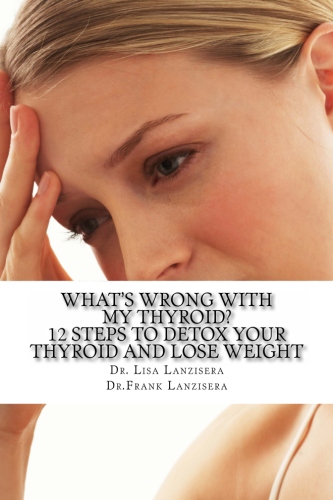Total Thyroid
17 Davis Blvd Suite 304
Tampa Florida 33606
813.253.2333
Verified byHealthProfs.com http://healthprofs.com/cam/541884.html
Total Regenerative Therapy
17 Davis Blvd Suite 304 1420 Celebration Blvd
Tampa FL 33606 Celebration Fl 34747
*Individual results may vary. The claims made on this site are no guarantee of success.The patient and any other person responsible for payment has the right to refuse to pay, cancel payment or be reimbursed for payment for any other service, examination or treatment which is performed as a result of and within 72 hours of responding to the advertisement for the free, discounted or reduced fee services, examination or treatment.
* This certification has been obtained through a private organization not recognized or affiliated with the Florida Board of Chiropractic Medicine.
Excerpt from Dr. Lanzisera's Thyroid Report, "THYROID DISORDERS EXPLAINED, Why Do I Still have Symptoms?"
First, let’s learn more about how the thyroid works...
In healthy people, the thyroid makes just the right amounts of two hormones, T3 and T4. These hormones have important actions throughout the body. Most importantly, they regulate many aspects of our metabolism, affecting how many calories we burn, how warm we feel, how much we weigh…and our general well-being.
Thyroid Hormones are in Charge of our Metabolism
Thyroid hormones also have direct effects on most organs, including the heart which beats faster and harder under the influence of increased thyroid hormones (this is why heart problems can often accompany chronic thyroid problems in women, and perhaps why heart problems are more common in women under the age of 50).
T3 is the more biologically active hormone (it’s more important for cellular function), and in fact most of T4 (80%) is converted to T3 in the body’s peripheral tissues. So T4 is just a precursor for the more active hormone, T3.
One of the problems in some thyroid disorders is that you may have trouble converting T4 to T3 in your tissues (have you been checked for this?). This can create a deficiency of T3, disrupting the body’s ability to properly regulate metabolism…leading to specific symptoms.
The symptoms of thyroid disorders, including hypothyroidism and Hashimoto's, vary from extreme fatigue to dry, thinning hair. Thyroid disorders can affect the way we look, the way we feel, and even the way we think.
Some of the more common symptoms are fatigue, cold hands and feet, requiring excessive sleep, gaining weight easily, neck and back pain, constipation, depression,headaches, thinning hair, dry skin, heavy or irregular menstrual periods.
There are other symptoms that are less often associated with a thyroid problem as in a hoarse or raspy voice, yellow tinge to the skin, slower thinking, slower movement or speech, slow heart rate, and infertility. Children can also be affected by a low functioning thyroid gland.
ARTICLE
THE "SKINNY" ON WHY IT'S SO HARD TO LOSE EXCESS WEIGHT WHEN YOU HAVE A THYROID PROBLEM
One of the more common symptoms of thyroid disorders is the patient's inability to lose weight. Typically, this is the first clue that something is wrong. Often, the patient is told that the weight will come off once thyroid replacement medication is started. Unfortunately, this doesn't always occur and the weight gains can continue despite "normal" TSH levels. It may seem to the patient that it doesn't matter how little they eat or how much they exercise, the weight gain won't go away.
Changes in Brain Chemistry and Intestinal Hyper-permeability
Hunger is intricately tied to your brain chemistry. Your hypothalamus senses you need energy and issues the brain neurotransmitter, neuropeptide Y (NPY), with the message "eat carbohydrates." The surge of NPY is what you experience as "hunger," Once the hypothalamus senses you've eaten enough carbohydrates, it releases serotonin to tell the body "enough carbohydrates."
But this system can be dramatically altered by several factors, all of which can be present in chronic thyroid disease:
•Your metabolism is too slow for the appetite level set by your brain. Thyroid disease slows down the metabolism. What your brain perceives as appropriate food intake levels can then exceed your body's metabolism, creating weight gain.
•Your body is under stress, which interferes with the neurotransmitter functions, and is known to reduce the release of serotonin.
. 95% of your serotonin is not produced in your brain but in your gut. Hyperpermeability of the intestinal lining can be caused by food sensitivities, especially wheat gluten. Damage to the intestinal lining can lower serotonin production.
Summary: You can't diet your way out of this problem. The gut and brain issues need to be resolved first. Food sensitivity testing, nutritional counseling, brain based therapy, cortisol testing, and specific dietary modifications are ways to effectively treat this problem. Contact us for more information.
Excerpt from Dr. Lanzisera's THYROID REPORT "Thyroid Disorders Explained, Why Do I Still Have Symptoms?":
Hashimoto’s Thyroiditis is a condition in which the body’s immune system attacks the thyroid gland (this is an auto-immune disorder). It is diagnosed by checking for thyroid antibodies (TPO & TGB). Hashimoto’s is not a thyroid disease but an immune system disorder and the most common autoimmune disorder. As Dr. Datis Kharrazian DC, MS states in his book, "Why Do I Still Have My Thyroid Symptoms When My Lab Tests Are Normal?", when addressing an autoimmune disorder like Hashimoto’s, the goal is to restore balance to the immune system. The foundation of care is to support a patient’s overall health. Unstable blood sugar, gut dysbiosis (abnormal gut bacteria), and poor adrenal health worsen an autoimmune condition. Removing gluten from the diet is also vital given the studied links between Hashimoto’s and gluten intolerance.
Taken together autoimmune diseases strike women three times more than men. Hashimoto’s thyroiditis effects 10 women for every man.
"I customize each patient’s treatment plan with a combination of brain based therapy (BBT) to improve functional brain imbalances, and nutritional supplementation and dietary modification to aid metabolic dysfunction that is found through lab testing.
I look forward to helping improve and change your life!"
Dr. Frank Lanzisera, DC, D.NMSc.*
____________________________________________________________
New Hypothyroidism & Hashimoto's Thyroiditis Symptoms
Some symptoms of hypothyroidism and Hashimoto's thyroiditis can be overlooked. Weight gain and fatigue usually take center stage while symptoms of brain fog are considered secondary. What is brain fog? - This is when you experience memory loss, can't think clearly, have trouble thinking of the right words to say, and find it hard to concentrate.
Excerpt from Drs. Frank and Lisa Lanzisera's newest book "What's Wrong With My Thyroid? :
Patients usually say their brain fog is one of the most annoying symptoms they have to deal with on a daily basis. It can be embarrassing in their professional world and disturbing if family and friends treat them as if they are “losing it”. The good news is that brain fog is usually one of the first symptoms to improve once treatment begins.
Spouses of our patients typically notice the difference first. It’s a wonderfully rewarding experience when a husband or wife thanks you for giving their spouse back to them. The truth is that all treatment is a team effort. The family has to be on board for any help to be effective. Too often we have seen the spouse not wanting to participate in the mate’s recovery. This puts such a burden on the one trying to get well. It’s difficult enough to begin treatment when you are still feeling sick. This initial effort is made so much easier with the help and support of the family.
Hypoglycemia
Hypothyroidism can cause a problem with glucose metabolism. Glucose (sugar) metabolism is the rate at which the body converts glucose for energy.
The brain uses glucose. It cannot function well if glucose metabolism is impaired and can lead to symptoms of brain fog: fatigue, irritability, and light-headedness.
People with low thyroid function have a problem with glucose being absorbed into their cells. Their cells also don’t use it as readily. On top of all this – once glucose does finally get absorbed, the cells have a difficult time eliminating it.
Hypoglycemia is associated with all six patterns of hypothyroidism. Most frequently, a low-functioning pituitary gland is involved as well as the adrenal and thyroid glands. The pituitary or “master” gland as previously described is the traffic cop for the body’s hormonal flow. Blood sugar fluctuations have a debilitating effect on the adrenal gland hormone output which disrupts the pituitary’s functions. The pituitary is the mid-level boss of the thyroid gland, so when the pituitary is not functioning well the thyroid gland suffers too.
Hypoglycemic symptoms can develop not because there isn’t enough glucose in the blood but because the glucose can’t be absorbed adequately by the cells.
The symptoms of hypoglycemia are:
· Confusion
· Blurry/impaired vision
· Poor short-term memory
· Agitated easily
· Craving for sweets and salty snacks
· Irritability especially when meals are missed
· Dependence on coffee/stimulants
· Lightheadedness
· Needing to eat to relieve fatigue
· Shakiness
· Dizziness
· Sweating, chills and clamminess
· Hunger and nausea
· Seizures
· Sleepiness
· Rapid/fast heartbeat
· Tingling or numbness in the lips or tongue
· Unconsciousness
If you or someone you care about are exhibiting symptoms of brain fog, hypothyroidism and hypoglycemia may be responsible.
NEW PATIENT INFORMATION
Dr. Frank Lanzisera, DC, D.NMSc. will consult with you about the details of your case and perform a thorough physical examination with neurological testing and metabolic assessment.
Dr. Lanzisera will review your examination findings with you, inform you if he will accept your case and, if he feels he can help you, give you his best treatment recommendations.
Dr. Lanzisera applies natural methods to help those with chronic thyroid conditions, working in conjunction with your primary care medical doctor and endocrinologist specialist. When applicable he employs present day natural methods as an adjunct to help improve your condition.
Call or email us to schedule your appointment with Dr. Lanzisera today.
(813) 253-2333
Trending information for thyroid conditions
Limited Complimentary Seating
813 253.2333
Stem Cell Therapy for Symptoms of Autoimmune Hashimoto's Thyroiditis and Grave's Disease
Author of "What's Wrong with My Thyroid?" and frequent TV guest doctor, Dr. Lanzisera, hosts this popular and highly informative seminar.
COST: LIMITED COMPLIMENTARY SEATING
REGISTER: (813) 253-2333 or complete form below. Be sure to indicate date of seminar and number of guests
Both men and women can have other conditions that can be related to thyroid disorders. Thyroid problems often involve multiple systems in the body and can produce a variety of symptoms. The most common systems are the nervous system, digestive system, immune system, other endocrine system organs, and the circulatory system.
- Autoimmune Disease - Hashimoto's Thyroiditis
- Autoimmune Disease - Graves' Disease
- Irritable Bowel Syndrome - IBS
Related Links
- Hypothyroidism & Infertility
- Hypothyroidism Natural Treatments
- Hypothyroidism Causes
- Thyroid Disease in Children
17 Davis Blvd Suite 304
Tampa, Fl. 33606
(813) 253-2333
DISCLAIMER: The information on this site is for Educational Purposes Only and is not designed to diagnose, treat, mitigate, prevent or cure any health conditions. The U.S. Food and Drug Administration has not evaluated statements about these health topics or any suggested product compositions.
Tampa - 833 831.4395
Celebration - 833 831.4396
google7954bcfe82cb7f6d.html
HASHIMOTO'S HYPOTHYROIDISM
~ Normalize weight ~ Increase energy ~ Reduce brain fog ~Sleep better
~ Regain thinning hair ~ Reduce anxiety ~ Restore health & vitality
This Total Thyroid®Approach begins...
with one of these 3 Easy Options:
Option
1
Attend a
TOTAL THYROID®SEMINAR
Limited Complimentary Seating
Option
2
Consult with
Dr Frank Lanzisera D.C,D.NMSc.*
Concierge style, high quality care
813 253.2333 for more information
Appointments Available
Option
3
*Individual results may vary. The claims made on this site are no guarantee of success.
® †TOTAL THYROID is a trademark registered in the US Patent and Trademark Office.


